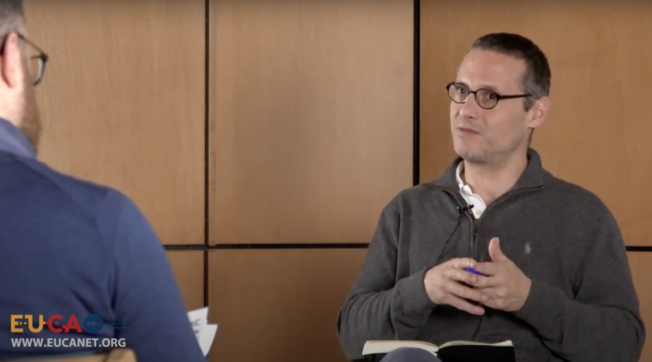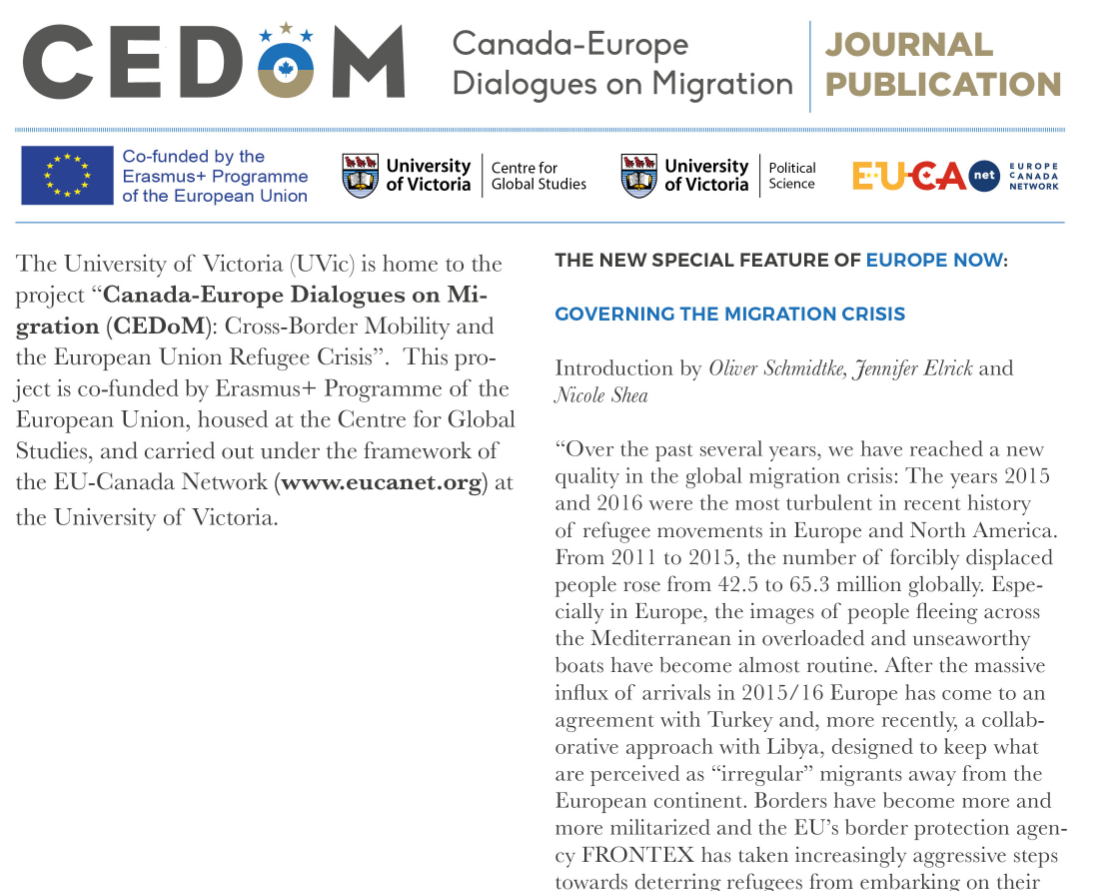Open Letter: The European and Canadian Public Needs a Reasoned Debate on CETA, by Eugene Beaulieu and others
By Eugene Beaulieu and others
This is an open letter to Europeans and Canadians signed by 16 academics based in Canada who believe in the value for democracy and society in a more reasoned and balanced debate on the Comprehensive Economic and Trade Agreement (CETA) between Canada and the European Union
“For years, we have been reading and listening to the opponents of the EU-Canada Comprehensive Economic and Trade Agreement (CETA). Sadly, they have often engaged the public by offering assertions that misrepresent what CETA is and will do, if it ever enters into force. As a result, although their cries have to some degree contributed to making the agreement achieve a better balance between openness and democratic autonomy, CETA’s opponents have generally made it difficult for the Canadian and European publics to benefit from an enlightened debate about CETA’s pros and cons. Paradoxically, these are often the same people who talk about the lack of transparency and democratic involvement when it comes to CETA. Today, believing what we call CETA’s myths, a majority of Walloon parliamentarians in Belgium, who are supported by many others in other parts of the EU as well as Canada, is about to block CETA’s ratification.
We do not wish to tell people on what side of the debate they should stand. Yes, most of us, following our analyses of the agreement from different perspectives, are of the opinion that CETA is overall a good agreement for both Canadians and Europeans, even if it is by no means perfect (such agreements never are!). But as academics we feel it is our duty to refocus the discussions and debates on CETA by dispelling what we think are the most significant erroneous assertions about CETA.
Assertion #1: CETA will lead to net job losses!
In an age when firms, big and small, are increasingly embedded in global value chains and rely on resources coming from such chains, both exports AND imports matter for productivity and job creation. The belief that only exports are good for job creation while imports take away local jobs is based on a flawed myth. Production and transportation networks are increasingly integrated, which allows for important efficiency gains that benefit firms and consumers. For example, Wallonia’s aerospace cluster Skywin would not exist if its companies could not integrate into the value chains of large aircraft manufacturers such as Canada’s Bombardier. The truth is that without international trade, Skywin and its 7,000 direct jobs would likely cease to exist. As for Bombardier, a Canadian multinational that has a strong presence in Europe, it would no longer be competitive, given that it relies on exports for most of its revenues, if it sourced and produced all of its planes and trains from with in Canada. Without the imports of high-quality products and services from Europe, Bombardier would not survive. Notwithstanding the importance of agreements like CETA for today’s production of goods and services, we are not blind to the fact that freer trade can also lead to job losses. However, instead of blanket statements that CETA will only kill jobs, it would be much better if the debate focused on the firms and sectors that are more likely to gain from the agreement and those that stand to lose.
Then, it is for individuals to decide where they stand vis-à-vis CETA, once they have a better grasp of the issues. A more nuanced discussion of likely benefits and costs also helps identify the areas where governments will likely need to intervene to mitigate the costs to those individuals and firms that will be hurt by CETA.
Assertion #2: CETA threatens our water, healthcare, environment, sovereignty, etc.
Again, in both Canada and Europe, CETA’s critics claim that governments on both sides of the Atlantic will no longer be able to regulate their societies and economies according to the wishes of their electorates because firms would force them to privatize public services as well as deregulate markets. The mechanism through which this would happen is known as investor-state dispute settlement (ISDS), whereby a firm can sue a government for financial compensation if it has not been treated fairly and equitably (e.g., in the case of an expropriation) and has suffered a loss as a result. The reason behind ISDS is that, as local courts are obliged to follow local laws, foreign firms may have no legal recourse through the domestic judicial system if domestic laws allow unfair and inequitable practices. This is why Canada and European member states have already signed several bilateral investment treaties with third countries that contain such ISDS provisions. CETA’s investor protection provisions in chapter 8 do not give a Canadian or European firm the right to seek compensation because it does not like certain government policies or regulatory standards. CETA’s language in Article 8.9 is very clear on this. The Joint Interpretative Declaration agreed less than ten days ago reinforces further this notion of government control over policy and regulation. This declaration will ensure full clarity in how the treaty should be interpreted, including in tribunals or other formal dispute-resolution mechanisms, should there be any dispute in the future. In addition, it is important to mention that CETA’s ISDS provisions do not require a government to change its behaviour, simply to compensate financially an investor (usually firm but it could also be an individual) in case there is unfair and inequitable treatment. As such, it can be less invasive than a state-to-state dispute settlement decision requiring a state to withdraw the measure.
Assertion #3: CETA’s ISDS mechanism will be biased in favour of firms
In addition to the above, CETA’s critics argue that the ISDS mechanism will be biased in favour of firms against governments because there have been some cases involving other jurisdictions or agreements where private-sector arbitrators demonstrated a certain degree of bias for what were or could be clients. To remedy this possibility, Canada and the EU have agreed to set up a permanent tribunal whose members will be appointed solely by the Canadian federal government and the European Commission, instead of having ad hoc panels of arbitrators selected by both investor and state. Surely, Canada and the EU will not name judges that would have known or perceived biased against governments. They will want to make sure that the judges are as impartial as possible so that the judges in an ISDS case properly treat their firms.
Assertion #4: CETA will force Europeans to eat unsafe Canadian beef and pork
CETA’s critics claim that Europeans will be inundated with Canadian beef and pork raised on hormones and genetically modified organisms. First of all, the quotas allocated by the EU under CETA for the duty-free importation of Canadian beef and pork represent less than one percent of the EU’s production. So it is difficult to see how Canadian meat could flood the EU as a result of CETA. Second, Canadian producers would still have to satisfy EU standards for meat production if they want to export their beef and pork across the Atlantic. CETA does not change that. Moreover, Europeans should note that the Japanese, who are as sophisticated and safety-concerned as European consumers, consume important volumes of Canadian pork. Canadian producers are thus able to meet exacting standards. The agreement does, however, encourage Canada and the EU to work together to bring their regulation closer to each other but it is not an obligation. It is actually very possible that those Canadian beef and meat producers who want to take advantage of the EU market will choose to adopt the EU sanitary standards and ask the Canadian federal government to recognize them as acceptable.
Assertion #5: CETA can easily be renegotiated to accommodate critics’wishes
Opponents of CETA claim that the agreement should be renegotiated to reflect their preferences, which are often unspecified or already satisfied by what is actually found in the CETA text. It is for a reason CETA took seven years to negotiate. Achieving the right balance between satisfying key offensive and defensive interests, on the one hand, and accepting to compromise on other issues is a tricky and lengthy undertaking. The Pandora’s box cannot just be opened, modified and closed up again. CETA is a finely balanced agreement whose parts jump out in the air if you reopen it.
Eugene Beaulieu, Professor of Economics, University of Calgary
Yan Cimon, Professor of Management, Laval University and Director of the Interuniversity Research Centre on Enterprise Networks, Logistics and Transportation (CIRRELT)
Valerie D’Erman, Postdoctoral Fellow of Political Science, University of Victoria
Christian Deblock, Professor of International Political Economy, UQAM
Erick Duchesne, Professor of Political Science, Laval University
Kurt Hübner, Professor of European Studies and Jean Monnet Chair, University of British Columbia
Patrick Leblond, CN-Paul M. Tellier Chair on Business and Public Policy and Associate Director, Graduate School of Public and International Affairs, University of Ottawa
Frédéric Mérand, Associate Professor of Political Science and Director of the Centre d’études et de recherches internationales de l’Université de Montréal (CERIUM), Unversity of Montreal
Armand de Mestral, Professor emeritus and Jean Monnet Chair in the Law of International Economic Integration, McGill University
Richard Ouellet, Professor of International Economic Law, Laval University
Stéphane Paquin, Professor and Canada Research Chair in International and Comparative Political Economy and Globalization, École nationale d’administration publique
Michèle Rioux, Professor of Political Science and Director of the Centre d’études sur l’intégration et la mondialisation (CEIM), UQAM
Ari Van Assche, Associate Professor of International Business and Director of the Department of International Business, HEC Montreal
Amy Verdun, Professor of Political Science, Jean Monnet Chair Ad Personam, and Director of the Jean Monnet Centre of Excellence, University of Victoria
Crina Viju, Associate Professor of European Economic Integration, Carleton University
Thierry Warin, Associate Professor of International Business, HEC Montreal and Vice-President of CIRANO (Centre Interuniversitaire de Recherche en Analyse des Organisations)
For media requests with EUCAnet experts: \
University of Victoria:
Valerie D’Erman, vjderman@uvic.ca, 250-853-3552
Amy Verdun, averdun@uvic.ca, 250-7217490
University of British Columbia:
Kurt Hübner, Kurt.huebner@ubc.ca, (604) 822-9439
University of Ottawa:
Patrick Leblond, pleblond@uottawa.ca, (613) 562-5800 x2953
University of Montreal:
Frédéric Mérand, frederic.merand@umontreal.ca, (514) 343-7176
McGill University:
Armand de Mestral, armand.de.mestral@mcgill.ca, (514) 398-6643
Carleton University:
Crina Viju, crina_viju@carleton.ca, (613) 520-2888









 https://www.zdf.de/nachrichten/heute/ceta-abkommen-mit-kanada-ist-mit-eu-recht-vereinbar-100.html
https://www.zdf.de/nachrichten/heute/ceta-abkommen-mit-kanada-ist-mit-eu-recht-vereinbar-100.html https://www.dw.com/de/f%C3%BCnfte-amtszeit-von-angela-merkel/a-53453226v
https://www.dw.com/de/f%C3%BCnfte-amtszeit-von-angela-merkel/a-53453226v